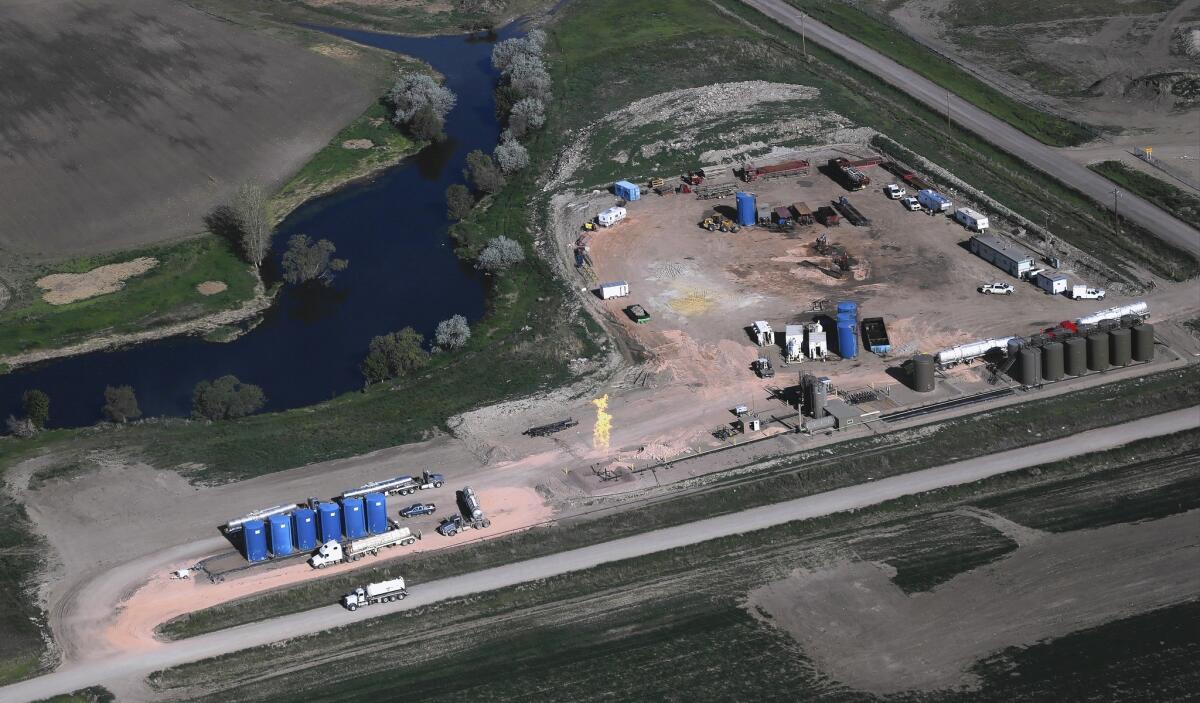Diesel is used in fracking without permits, report says

- Share via
Reporting from washington — Energy companies have used thousands of gallons of diesel to frack for oil and gas without obtaining the necessary permits required under federal law, according to a new report by the Environmental Integrity Project.
The watchdog group’s review of industry and federal data from 2010 to 2014, released Wednesday, found 351 wells in 12 states that used diesel in fracking.
Also known as hydraulic fracturing, the process involves high-pressure injection of millions of gallons of water mixed with sand and chemicals to crack geological formations and tap oil and gas reserves.
Because diesel contains carcinogens and neurotoxins, its use in fracking is regulated by the Environmental Protection Agency and requires that companies meet a set of guidelines.
Though companies are required to get permits under the federal Safe Drinking Water Act if they use diesel to supplement water in fracking, the report found that no states had issued permits for the 351 wells.
Industry groups and the EPA have said that companies are phasing out diesel, which in February was used in only about 2% of wells.
The report is the latest of several that recently have turned the spotlight to long-standing public concerns about fracking’s effect on water supplies.
In June, the Government Accountability Office issued a report critical of the EPA’s efforts to protect groundwater from the underground disposal of waste associated with oil and gas production. The GAO said seven of eight states had not issued permits for diesel use in fracking because they maintained the practice did not occur in their jurisdictions.
A July article in the Pittsburgh Post-Gazette said oil and gas work had “damaged” water supplies in Pennsylvania 209 times over the last seven years. On Tuesday, Stanford University scientists said energy companies have fracked into underground sources of drinking water in Wyoming.
The EPA said it was reviewing the integrity project’s report.
Steve Everley, a spokesman for industry research arm Energy in Depth, said the integrity project “has systematically and deliberately abused the data to suggest ‘diesel fracking’ is occurring where it is not.”
The industry group pointed out that the 351 wells that the project cited as using diesel constitute less than 0.5% of the more than 77,000 wells registered on FracFocus, the website where companies voluntarily post information about the substances they use in their fracking fluids.
Because of the voluntary nature of the site, however, companies can choose to exclude various fracking chemicals as trade secrets without explanation or verification. The project contends such broad discretion could allow some companies to hide their diesel use.
Energy in Depth also said that states issue permits for fracking with diesel under their own regulatory standards, which might have been overlooked by the integrity project’s study.
But Mary Greene, the report’s author, said companies using diesel in fracking need to get permits under the Safe Drinking Water Act, which are generally far more stringent than state requirements.
The report found no records of states granting permits or receiving applications for them. The states include Texas, Colorado, North Dakota, Arkansas, Oklahoma, Wyoming, New Mexico, Utah, Kansas, Pennsylvania, West Virginia and Montana.
In February, the EPA issued recommendations to states regarding the standards that companies need to meet to use diesel, including more detailed information about a well’s construction and additional testing required of wells before diesel is used. But the guidance is non-binding.
Upon the issuance of the recommendations, many companies indicated that they “planned to discontinue the use of diesel in their operations,” said Alisha Johnson, a spokeswoman for the EPA.
More to Read
Inside the business of entertainment
The Wide Shot brings you news, analysis and insights on everything from streaming wars to production — and what it all means for the future.
You may occasionally receive promotional content from the Los Angeles Times.











